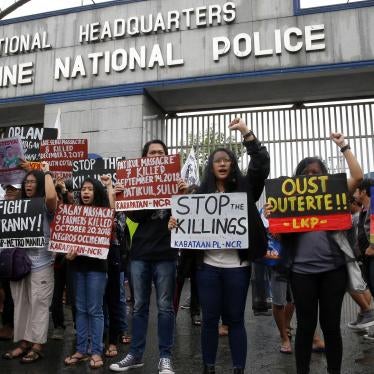Last year in Geneva, Iceland put the Philippines in the hot seat at the United Nations Human Rights Council for its murderous “war on drugs.” The boldness of a small country with no axe to grind against the Philippine government – acting solely out of its commitment to human rights – elicited widespread admiration from rights advocates everywhere.
Iceland wasn’t fazed by President Duterte’s popularity or by Malacanang’s threats. It simply stood against the brutality of the “drug war” and the deaths of thousands of Filipinos – and demanded international scrutiny. When the council convenes its session today, other countries would do well to follow Iceland’s principled example.
Despite the Philippines’ propaganda and misinformation campaign last year to try to block the resolution, Iceland’s leadership succeeded. The council passed a resolution denouncing the killings and other abuses and tasking the Office of the UN High Commissioner for Human Rights to produce a comprehensive report about the human rights situation in the Philippines.
On June 4, the UN rights office published a damning report that affirmed the allegations of “numerous systematic human rights violations.” Since Duterte took office in July 2016, it said, at least 8,663 people have been killed in the drug campaign, with other estimates of up to triple that number. Another 208 human rights defenders, journalists, and trade unionists were killed for their work there, the report found. Twenty-three UN human rights expert bodies supported the report and called for an on-the-ground international investigation.
In response, the Philippine government has pulled out its bag of tricks. Trick one was to cause confusion about the numbers – but even the statistics the police themselves released show that “drug war” killings rose 50 percent during four months of the Covid-19 pandemic, from April to July. Trick two was to claim that the government is really trying to ensure accountability and support those affected by the anti-drug campaign – but then leave the children whose father or mother were gunned down to fend for themselves. Human Rights Watch documented their plight in a recent report.
Trick three was to make it appear the government can itself provide accountability, even as President Duterte publicly calls for the Customs Department to start killing drug suspects. During the discussion on the Philippines at the Human Rights Council in June, Justice Secretary Menardo Guevarra sprang a surprise: a “review panel” had been created, he said, to examine the then 5,655 “drug war” deaths (now 5,810) for which the police officially take responsibility. Turns out the panel is composed of the same people and agencies who have been carrying out the “drug war” -- making the idea that they will hold themselves and their colleagues accountable nothing less than absurd.
UN member countries should take this Justice Department “review panel” with a whole shaker of salt. It seems designed to thwart the Human Rights Council from taking meaningful, follow-up action. In the end, the only way states can gauge the sincerity of the Duterte administration in addressing the abuses linked to the government is through its actions – or inactions.
What is clear is that almost none of the killings have been seriously investigated by the police, let alone gone to trial. Of the thousands of deaths, only one case, the murder of 17-year-old Kian delos Santos in August 2017, has resulted in the conviction of police officers. And that was really a matter of the relatives getting the CCTV footage of the killing before the police could, and the footage going viral. Not even the Justice Department, in its report to the Human Rights Council, could identify any other “drug war” case.
This month, states at the Human Rights Council will decide what to do next. More than 60 organizations around the world are calling for the council to establish an independent, international investigation into human rights violations in the Philippines. Malacañang, meanwhile, seems hell-bent on getting itself off the council’s agenda. Governments should resist the pressure and instead follow Iceland’s leadership by holding the Duterte government to account.
|
Commentary
Countries at the UN Should be Bold, Principled on Philippines
Published in:
Philippine Daily Inquirer
Your tax deductible gift can help stop human rights violations and save lives around the world.
Region / Country
Most Viewed
-
November 25, 2019
A Dirty Investment

-
June 3, 2025
“They’re Ruining People’s Lives”

-
January 25, 2024
“We’re Dying Here”

-
February 19, 2018
“All We Want is Equality”

-
December 4, 2020
“They’re Chasing Us Away from Sport”




